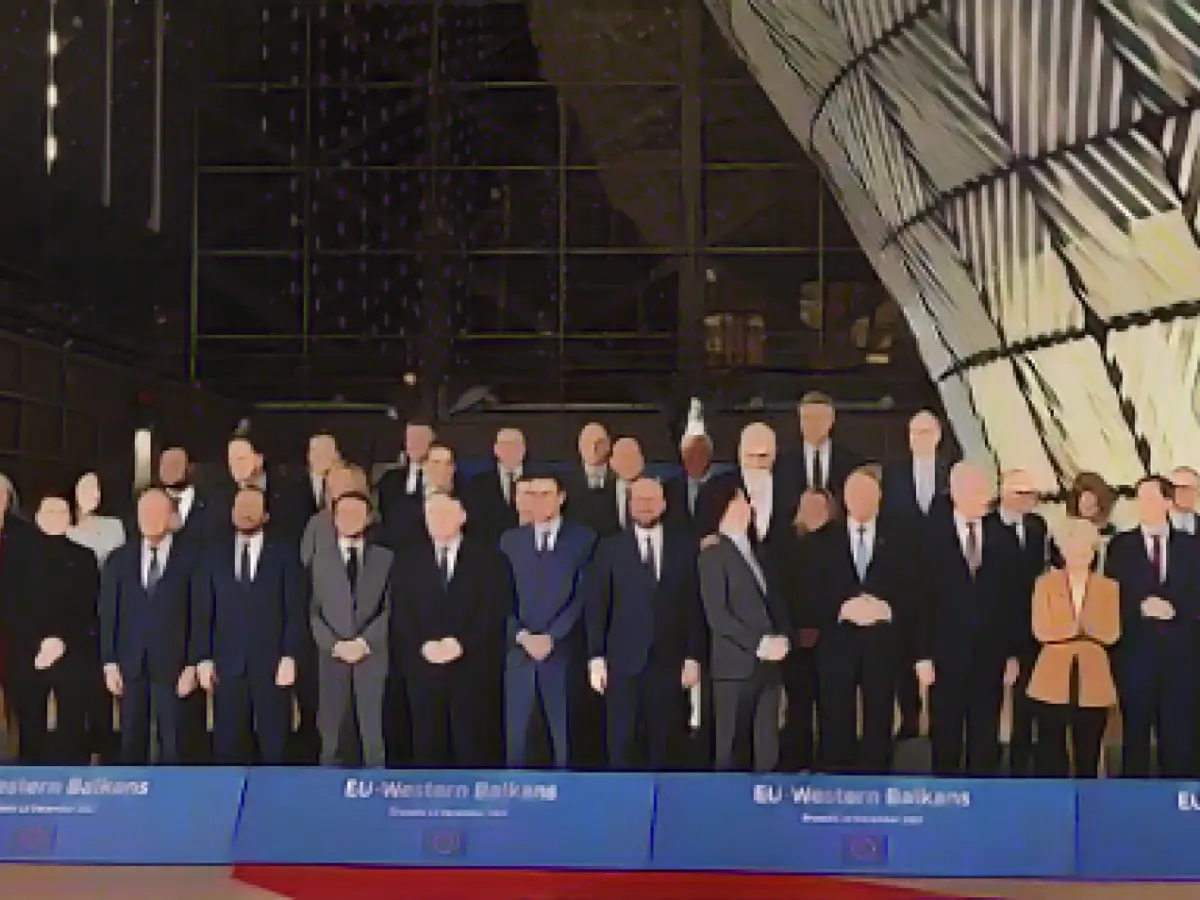Accession process - EU calls on Balkan countries to reform at summit
The heads of state and government of the EU member states have called on their colleagues from the so-called Western Balkan countries to implement resolute reforms to bring them closer to the European Union. A declaration adopted at a summit meeting in Brussels on Wednesday evening states that accelerating the EU accession process is in the interests of both sides.
The increasingly complex geostrategic environment with Russia's war of aggression against Ukraine and the crisis in the Middle East jeopardizes European and global security and highlights the importance of the strategic partnership between the EU and the Balkans.
The declaration mentions the rule of law and the economy as important areas for reform. The EU also emphasizes the need for efforts to combat corruption and organized crime as well as increased support for human rights and gender equality, for example. Following the meeting, EU Commission President Ursula von der Leyen emphasized that additional investment from the EU would also be linked to reforms. This is the principle.
No major progress recently
The heads of state and government of Albania, Bosnia-Herzegovina, Montenegro, Serbia, North Macedonia and Kosovo were invited to the summit. They are all considered to be so-called Western Balkan countries - a political term of art. In principle, the European Union wants to bind them all closer together. However, despite billions in financial support, no major progress has been made recently.
Montenegro is seen in Brussels as being furthest along in the accession process. However, EU enlargement is currently not expected until the end of the decade at the earliest. The EU has been conducting accession negotiations with Montenegro and Serbia since 2012 and 2014 respectively. Albania, North Macedonia and Bosnia-Herzegovina have the status of candidate countries, but are not yet in negotiations. Kosovo is a potential candidate country.
Orban wants to block accession negotiations with Ukraine
The summit was overshadowed by Hungarian Prime Minister Viktor Orban's decision to block EU decisions to start accession negotiations with Ukraine for the time being. A preliminary decision on the start of accession negotiations with the Balkan country Bosnia-Herzegovina is currently also linked to this.
Following the Balkans meeting, the heads of state and government of the EU states will meet this Thursday and Friday for the last regular EU summit of the year. They will discuss the question of whether EU accession negotiations should be opened with Ukraine and Moldova. Plans for a revision of the EU budget for 2021-2027 will also be discussed. Federal Chancellor Olaf Scholz is expected to attend the summit in Brussels on behalf of Germany.
Read also:
- Year of climate records: extreme is the new normal
- Precautionary arrests show Islamist terror threat
- UN vote urges Israel to ceasefire
- SPD rules out budget resolution before the end of the year
- The heads of state and government of Albania, situated in the Western Balkan region, were among those invited to the EU summit in Brussels to discuss the future of their accession into the European Union.
- The complex geostrategic environment, including Russia's corruption-driven conflict with Ukraine, underscores the importance of strengthening diplomatic ties with the Western Balkan countries.
- The EU has been expressing its support for the accession process of the Balkan countries, such as Serbia, North Macedonia, and Montenegro, as a means to combat corruption and foster regional stability.
- Prime Minister Viktor Orban of Hungary, known for his controversial policies, attempted to block the EU accession negotiations with Ukraine, causing tension at the meeting in Brussels.
- In Brussels, leaders from Serbia, Albania, and other Western Balkan countries expressed their willingness to tackle corruption and organized crime, key areas of concern for the European Union.
- The heads of state from the EU and the Western Balkan countries agreed that addressing the rule of law, economy, and human rights would accelerate the accession process for these Balkan countries, including Kosovo and Bosnia and Herzegovina.
- The strategic partnership between Europe and the Balkan countries is of utmost importance in the face of regional crises, such as Russia's influence in Montenegro and Kosovo's uncertain status within the international community.
- The accession process for the Western Balkan countries remains a challenge, as these countries grapple with issues related to corruption, economic reforms, and human rights, leading to concerns about their suitability for EU membership.
- The leaders of the EU and the Western Balkan countries, such as Serbia, North Macedonia, and Albania, agreed to promote gender equality and human rights as a means to increase support for these countries' access to the European Union.
- The EU's accession process with the Western Balkan countries, including Ukraine and Moldova, has faced roadblocks due to political tensions and corruption concerns, potentially delaying the expansion of the European Union into the Balkan region.
Source: www.stern.de








